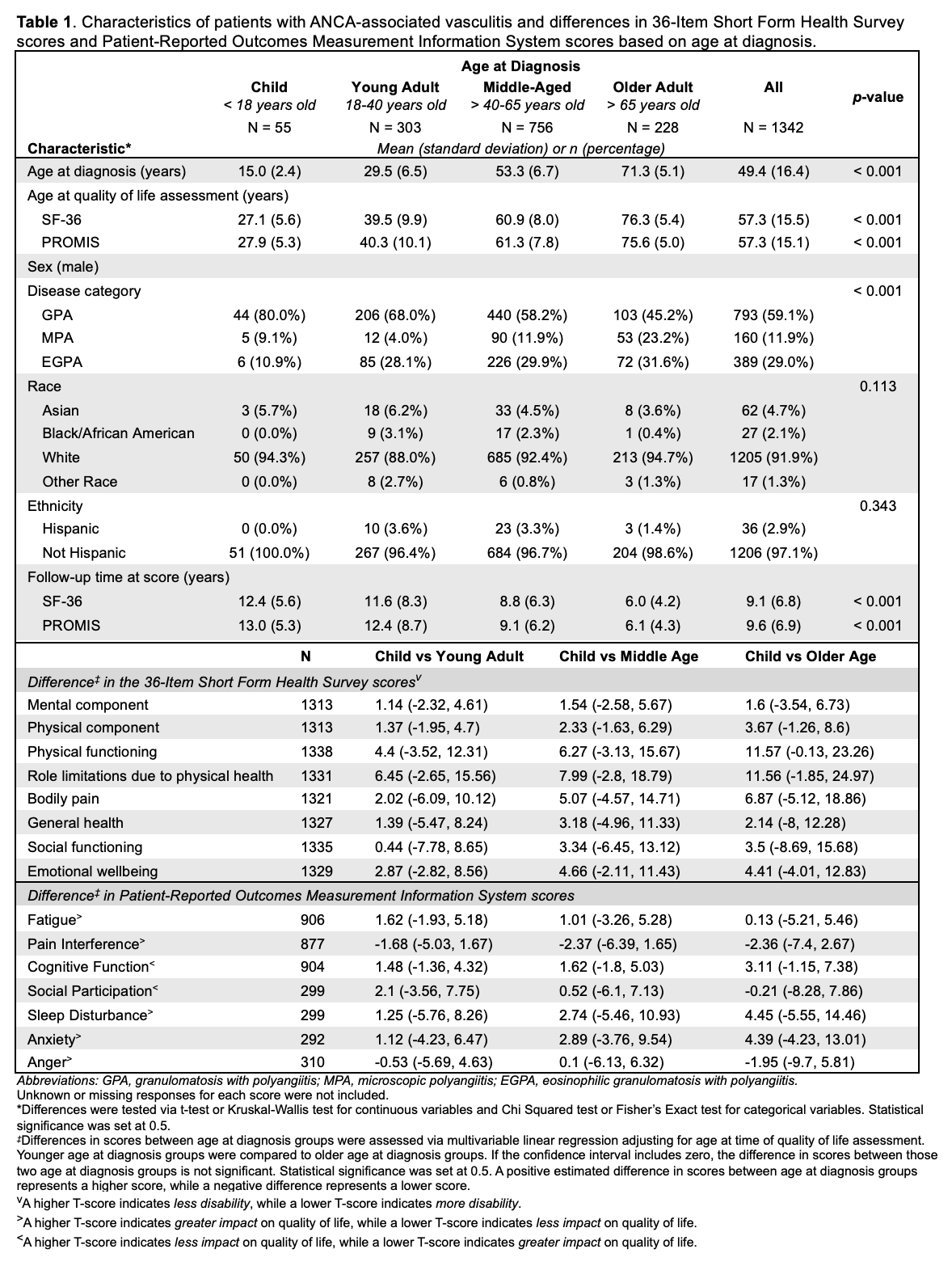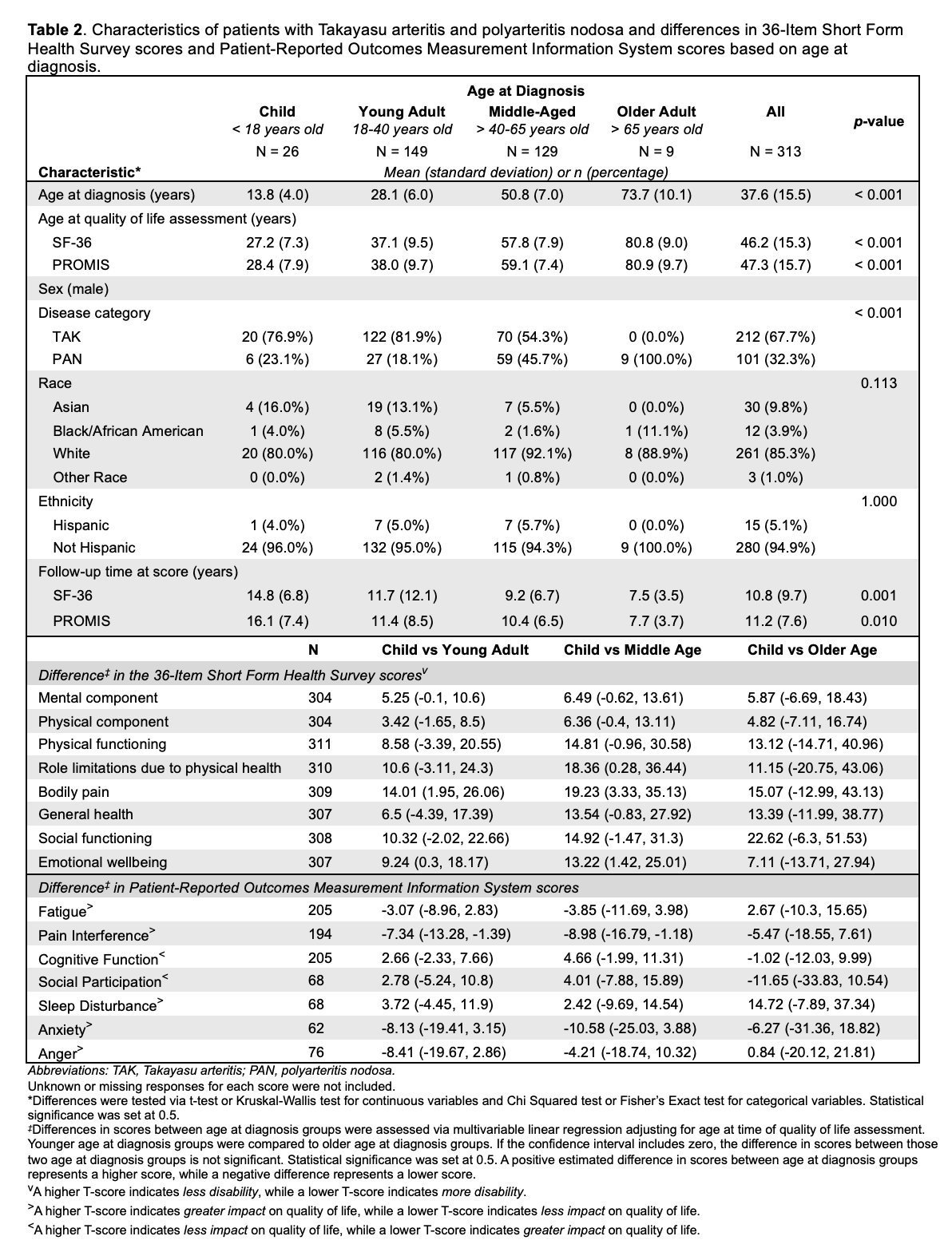Session Information
Session Type: Poster Session C
Session Time: 10:30AM-12:30PM
Background/Purpose: Vasculitis is a chronic autoimmune condition that significantly impacts patients’ quality of life. It is unknown whether the degree of this impact varies based on age at diagnosis, from childhood through older adulthood. This study examined the relationship between age at diagnosis with vasculitis and patient-reported outcome (PRO) measures on health-related quality of life.
Methods: The source of data was a longitudinal, prospective cohort of adults with granulomatosis with polyangiitis (GPA), microscopic polyangiitis (MPA) eosinophilic granulomatosis with polyangiitis (EGPA), Takayasu arteritis (TAK), and polyarteritis nodosa (PAN) enrolled from 2013-2024. Data were analyzed by ANCA-associated vasculitis (AAV: GPA, MPA, EGPA) and TAK/PAN, and were divided by age at diagnosis: children (< 18), young adults (18–40), middle-aged adults (41–65), and older adults ( >65). Descriptive statistics were summarized. Differences were tested via Student’s t-tests or Kruskal-Wallis tests for continuous variables and Pearson’s chi squared tests or Fisher’s exact tests for categorical variables. Univariable regressions and multivariable linear regressions adjusted for age at quality of life assessment were performed to assess for an association between age at diagnosis and PRO measure results (Patient-Reported Outcomes Measurement Information System [PROMIS] and the 36-Item Short Form Health Survey [SF-36]) at last follow-up visit.
Results: Analysis included 1655 patients (793 GPA, 160 MPA, 389 EGPA, 212 TAK, 101 PAN). In both the AAV and TAK/PAN cohorts, the degree of disability on the SF-36 increased with age at diagnosis for the physical component, physical functioning, role limitations due to physical health, and bodily pain. The degree of disability on the SF-36 did not differ with age at diagnosis for general health, social functioning, and emotional wellbeing. Those diagnosed with TAK/PAN in childhood had less pain interference than those diagnosed at older ages. There were no statistically significant differences between age at diagnosis groups for any other PROMIS measure. However, after adjusting for age at the time of quality of life assessment, there were no longer any significant differences in SF-36 or PROMIS scores based on age at diagnosis with vasculitis other than decreased impact on bodily pain, role limitations due to physical health, and emotional wellbeing SF-36 scores for those diagnosed in childhood with TAK/PAN.
Conclusion: Unadjusted analyses show an association between age at diagnosis with vasculitis and quality of life measures related to physical function and pain, and not social and emotional domains, with increased impact on patients diagnosed in older age groups. However, after adjusting for age at assessment, there was no association between age at diagnosis with vasculitis and patient-reported outcomes other than decreased impact on bodily pain, role limitations due to physical health, and emotional wellbeing for those diagnosed in childhood with TAK/PAN. Understanding the mechanisms by which age at diagnosis impacts the emotional and physical aspects of quality of life will be useful for developing targeted clinical interventions.
To cite this abstract in AMA style:
Bloom J, Pickett-Nairne K, Silveira L, Cuthbertson D, McAlear C, Merkel P, James K. The Association Between Age at Diagnosis and Patient-Reported Outcomes in Patients with Vasculitis [abstract]. Arthritis Rheumatol. 2024; 76 (suppl 9). https://acrabstracts.org/abstract/the-association-between-age-at-diagnosis-and-patient-reported-outcomes-in-patients-with-vasculitis/. Accessed .« Back to ACR Convergence 2024
ACR Meeting Abstracts - https://acrabstracts.org/abstract/the-association-between-age-at-diagnosis-and-patient-reported-outcomes-in-patients-with-vasculitis/


